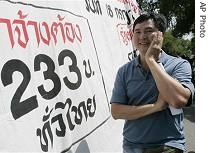2007年VOA标准英语-Political Uncertainty, Policy Changes Unnerve I
搜索关注在线英语听力室公众号:tingroom,领取免费英语资料大礼包。
(单词翻译)
By Ron CorbenBangkok
16 January 2007
Political and policy uncertainties1 cloud the economic outlook for Thailand this year. As Ron Corben reports from Bangkok, the military-installed government faces problems, some self-inflicted, that have led to confusion among foreign investors3, charges of mismanagement and an erosion of confidence.

Thai worker stands next to a sign calling for increased minimum wage in Thailand (File photo)
The Thai economy has had a shaky start to 2007.
Bomb blasts in Bangkok on New Year's Eve, which killed three people, along with controversial new investment rules imposed by the military-installed government have hurt business confidence.
The blasts came three months after a bloodless coup4 that ousted5 elected Prime Minister Thaksin Shinawatra. Mr. Thaksin, now in exile, had been accused of abuse of power and corruption6.
Thitinan Pongsudhirak, a political scientist at Chulalongkorn University, says the bombings have shaken the country.
"The bomb blasts on New Year's Eve were profound. We've never had bomb blasts, multiple bomb blasts, in central Bangkok like that. To me, the bomb attacks suggest that the military does not have the situation under control and it shows that the coup has gone wrong," said Thitinan.
Confidence in the junta7, known as the Council of National Security, was initially8 dented9 in December, when the central bank set new rules to discourage investors from pouring large amounts of overseas money into Thai investments. The goal was to keep the baht from rising, because the government fears a stronger currency will make Thai exports more expensive and uncompetitive on world markets.
But the unintended result was an immediate10 15 percent plunge11 in stock market prices, as investors raced to sell shares because they feared they soon would not be able to take their profits out of the country. Although authorities quickly lifted the parts of the rules that applied12 to stocks, the main index is still down more than 11 percent from its mid-December level.
The government was criticized at home and abroad first for the heavy-handed and sudden way it changed the rules, and then for the rapid retreat. Many market analysts13 say the government appeared indecisive and as if it had not fully14 thought out its actions.
Further uncertainty15 came this month, with a tightening16 of the Alien Business Law, which governs foreign investment.
"On the economy we are seeing haphazard17 public policy and mismanagement over the baht appreciation18. Now the amendments19 to the Alien Business Law are going to be a cause of concern for investors. So on all fronts, both the military and the government, appear embattled," added Thitinan.
The changes limit foreigners to owning no more than 50 percent of a company in Thailand. They were prompted by the controversial sale last year of Mr. Thaksin's family company to a Singapore investment conglomerate20.
Gary Woollacott, president of the Australian Thai Chamber21 of Commerce in Bangkok, says investors may look to other countries in light of the new rules and uncertainties.
"People will have to reconsider whether they come and invest in Thailand. None of us wants that to happen - we're all quite strong believers in Thailand, that's why we've chosen to locate ourselves here," said Woollacott.
Thai Finance Minister Pridiyathorn Devakula has tried to calm fears by saying the new law will affect far fewer companies than many investors think.
But Arporn Chewekrengkai, chief economist22 with the Government Pension Fund, says even if that is true, the policy moves have already damaged investor2 sentiment.
"The damage has been done," said Arporn. "I think it will take quite some time to restore this confidence because it is the wrong signals that are clearly out. It is quite difficult."
Arporn fears the economy will weaken because she expects lower exports, reduced domestic consumption and reduced investor confidence.
She also fears the political atmosphere could sour further if opponents of the current government take to the streets in protest.
Another casualty of the uncertainty is the lucrative23 tourism industry. Several countries have issued warnings to their nationals about the possible dangers of traveling to the "Land of Smiles," as Thailand calls itself, because of the recent bombings and the political uncertainty.
Despite the problems and policy changes, some analysts remain upbeat about the economy. Shamika Sirimanne is a senior economist with the United Nations Economic and Social Commission for Asia and the Pacific in Bangkok.
"Good prospects24 going into 2007. We predicted it will grow about 4.7 percent - this is the same prediction we had after the [September 19] coup. So we still maintain these predictions. Thailand still looks pretty good - good macro-economic fundamentals so it gives confidence to someone entering the country," said Sirimanne.
However, Sirimanne says Thailand's government must restore confidence and boost investment to keep the economy growing.
Some market analysts warn that potential foreign investors may put plans on hold until an elected government comes to power, possibly by the first quarter of 2008.
Such delays, they say, will slow growth and undermine confidence in the government's ability to sustain a healthy economy.




